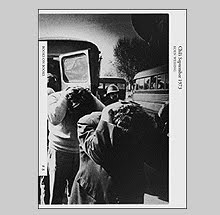Nein, Onkel from the Archive of Modern Conflict
Nazis like having sack races.
Nazis like sad eyed puppies.
Nazis like amusement rides.
Nazis like skipping rocks on water.
Nazis like sunbathing nude.
Nazis like to pretend inanimate objects are their penises.
Nazis like lying in fields of flowers.
Nazis like making children’s toys.
Nazis like dressing in drag.
Nazis like to get spanked.
Nazis like to do the Can-Can.
Nazis like fluffy bunnies.
Nazis like beautiful sunsets.
If this sounds more like vignettes from the 1960’5 TV show Hogan’s Heroes than real life then you will be profoundly surprised by the book Nein, Onkel (No, Uncle) published in 2007 by The Archive of Modern Conflict. Subtitled, Snapshots from Another Front 1938 - 1945, Nein, Onkel is a collection of imagery about the lighter side of fascism edited by Ed Jones and Timothy Prus.
This book shouldn’t come as a surprise to us but yet it does. Our image of the Nazis and German fascism is so synonymous with the Final Solution that it is easier for us to simply index them as monsters when in truth, beyond ideology; they shared common experiences of life as any of us. Obvious but forgotten.
My childhood image of Nazis was formed by the show Hogan’s Heroes until I learned the full details of the Holocaust. Needless to say that there was a huge disconnect between the images of the incompetent Colonel Klink and the lovable teddy bear Sgt. Schultz and what I had learned in school. Nazis were bumbling fools who were easily tricked. They tried to show hardened exteriors but they couldn’t help revealing their human and emotive insides. Oddly, as controversial as Hogan‘s Heroes was for being a situation comedy set in a German POW camp, it probably should have been more controversial for giving a different image to Nazis that made them into humans; albeit cartoon-like versions of humans. (One thing I still think is brilliant is that the show’s catch phrases of Schultz’s proclamations of “I know nuhzink! I see nuhzink!” actually alluded to the excuses given by German citizens when asked as to whether they knew the Final Solution was being carried out).
Nein, Onkel is as much a mirror held up to us as it is to “them.” Many of the shenanigans pictured here are not much different than what takes place on most college campuses around the world and the jokes cracked would be the same whether on the Russian Front or around a poker table in someone’s living room in Paramus, New Jersey.
This book starts to chip away at the defensive wall we create to differentiate them from us. We would all like to imagine that “we” would not be capable of such brutality while standing on our moral and ethical high ground but the subtext of a book like this makes it clear that, under the right circumstances “we” are capable of any despicable deed (or ignoring despicable deeds when they happen).
Nein, Onkel is designed to look like a photo album that you might discover in your uncle’s attic. In every way it is perfect as a book object from the padded and puffy canvas covers to the thick paper stock and fine printing of the 321 color and black and white photographs. The book has no text with the exception of a caption list printed on the last pages of thin, tissue-like paper.
It will be books like this that expand the understanding of ourselves beyond our reactionary mindset to create distinctions between us and the other. Perhaps Dylan saw this clearly when he penned his famous lyric from It’s Alright, Ma (I’m Only Bleeding): “…even the president of the
(or choke on a pretzel)












